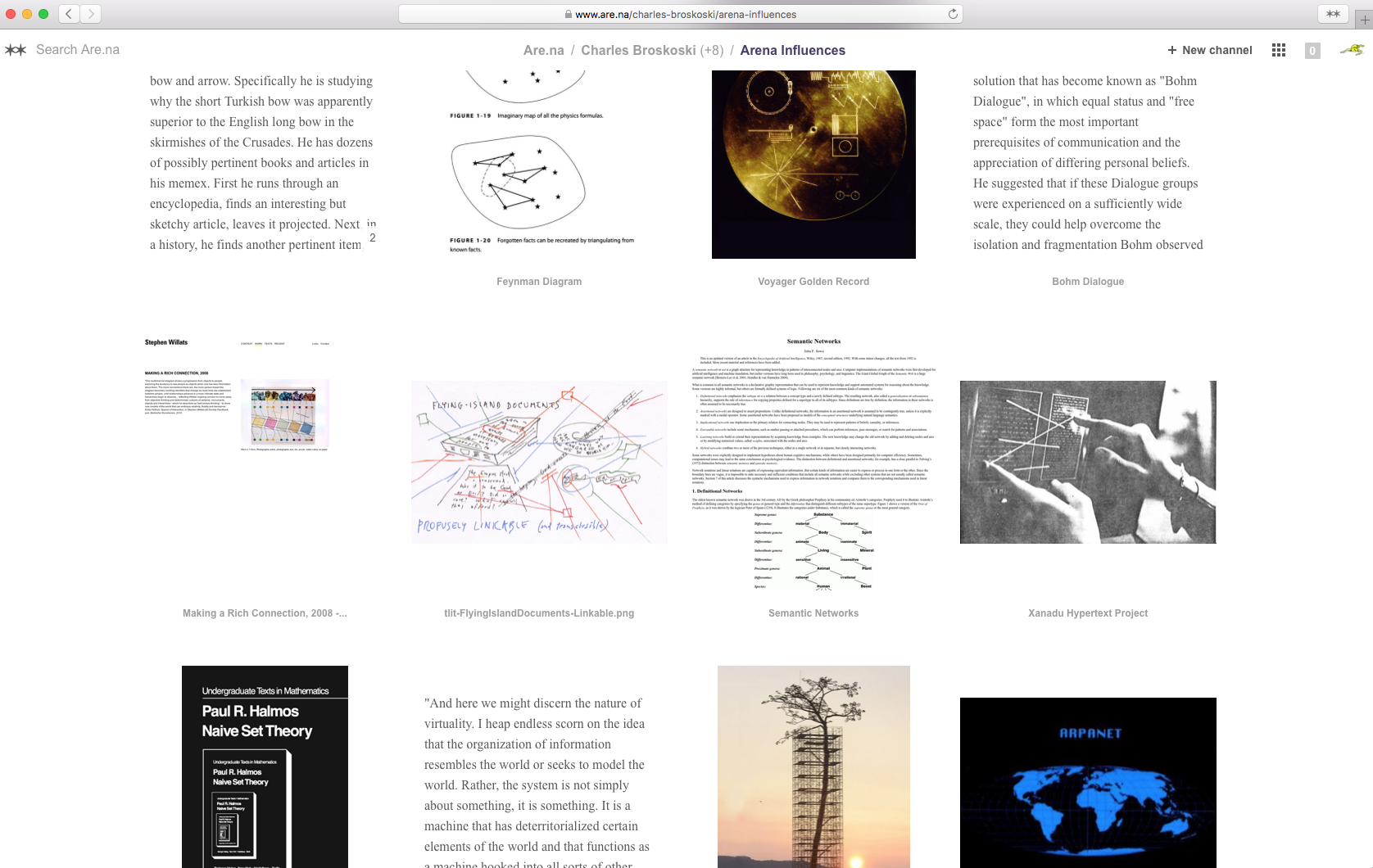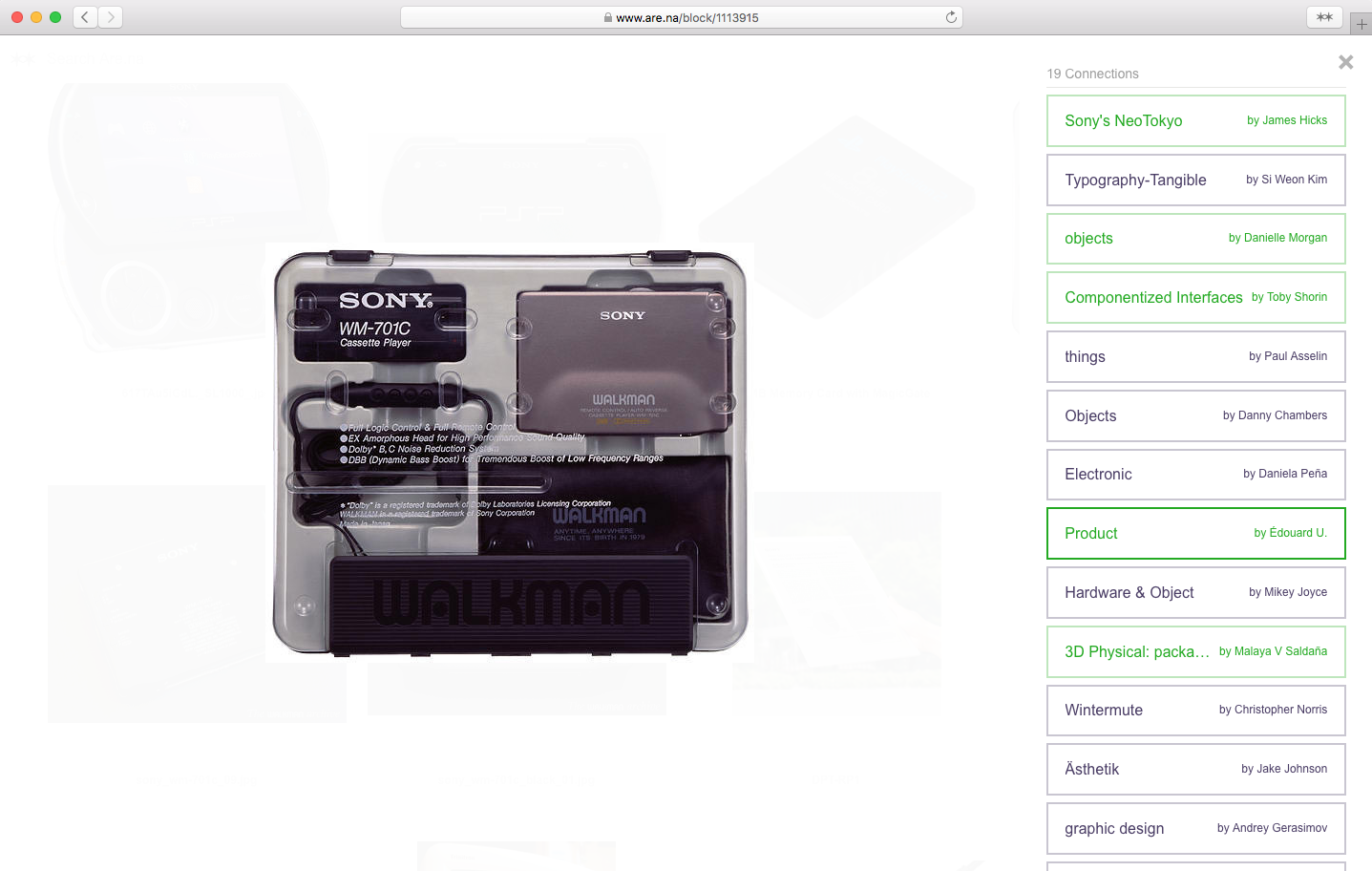Screwing around and the value of alternative knowledge platforms

Through the lens of Stephen Ramsay’s concept of “screwing around”, this commentary looks at the value of alternative knowledge platforms such as Are.na as a tool to counteract the linear and restrictive roads a search engine can lead a researcher down.
Keywords
knowledge exploration, knowledge sharing, knowledge organisation, knowledge networks, research practices, social media
Introduction
In his 2010 text “The Hermeneutics of Screwing Around; or What You Do with a Million Books”, Stephen Ramsay explores debates on the issue of canonicity, comparing two approaches on how to deal with access to abundant information: searching and browsing (5). When searching, a person has a question in mind, and employs a variety of methods to find an answer. With browsing, a person is exploring with no end goal, they are open to surprise. Visits to a physical library afford the chance to do both, however, on the web, it is not so easy to be surprised.
Ramsay writes in favour of browsing, asking if we are “ready to accept surfing and stumbling – screwing around” as part of our research methods (7). We are encouraged to take the issue of canonicity not as an invitation to create more structure, more reading lists, but instead to embrace “community, relationship, and play” (9).
Standard practice
The vast majority of students begin their research using search engines, and this has powerful implications for knowledge production (van Dijk 583). When large groups from academia put trust in huge commercial search engines like Google to answer initial queries, the algorithmic models do not simply narrow down searches but directly “co-produce” knowledge (575). This takes agency, playfulness and creativity, out of the research process
Researchers may, understandably, lean towards more dominant online tools such as Google because they are wary of the reliability of alternatives (Proctor et al. 47). The reality is, since search engines like Google and Google Scholar organise results using models that value popularity over relevance (van Dijk 580), we should be equally suspicious of the reliability of search engines.
Academic interest in online knowledge production has risen dramatically since 2015 (Ahmed etc al. 79). Whether it be in the context of business or education, people are increasingly using platforms for sharing and exploring knowledge (81-82). It is therefore worth thinking seriously about how the tools we use are shaping our research practices. As van Dijk claims:
A critical discussion of digital knowledge production is important because society needs students and scholars who are not only competent users of search engines, but who can also reflect critically on the principles of knowledge formation. (575)
The popularity based models of search engines can still be useful, efficient and accurate (580). However, they can also lead to very linear search practices, drawing from a narrow consensus that leaves little room for creativity. By relying too heavily on a search engine like Google, researchers miss out on the aspects of community, relationship and play Ramsay argues are highly valuable.
Alternative knowledge platforms
Ramsay imagines a practice in which people say to each other “here’s what I found, what did you find” (7). This is happening on Are.na, an online, user-owned platform created by artists who were equally frustrated with what to do with all the information in the world. Used mostly by designers, artists and academics, it is a space to explore, organise and share knowledge through networked channels and blocks created by people, not algorithms.
Speaking on how Are.na works structurally, co-founder Charles Broskoski says:
Are.na consists of two units: blocks and channels. Blocks are units of information (a piece of text, an image, a URL, a file, etc.) and channels are containers for blocks. Channels can contain any number of blocks and blocks can exist in any number of channels. Thus, pieces of information can be arranged in an infinite variety of contexts—their respective meanings shifting as the proximate information shifts. (Gerald Nelson)

There are a number of affordances on Are.na which encourage a more communal yet importantly critical approach to knowledge exploration. One such affordance is the “connect” button, a conscious choice from the co-founders (Chiaverina). Taking the place of a “like” button, it encourages users to think against the standard popularity models of search engines and critically reflect on whether material they discover is actually a good fit for a project, not only liked or cited by many people.
Are.na also affords the ability to add any kind of media into a channel, whether it be a text, a screenshot or a video. As a new media student and artist, I find this feature particularly valuable, as resources I collect come in many formats. When resources are diverse and laid out in square blocks as opposed to lists, I feel encouraged to browse and stay open to surprise.
One final aspect of the platform worth mentioning is that it allows for sources from outside the academic norms of practice to take up equal space in a research process. Having these sources appear in Are.na channels encourages the decolonisation of knowledge, a difficult struggle for many academics (Reyes Cruz 652), as it visualises the validity of such contributions.
Future considerations
Ramsay’s text inspires thoughts of how the affordances of online knowledge platforms can either encourage or discourage a kind of community magic to unfold.
In a text written on Are.na, designer and Are.na user Édouard U., claims “When ideas and the concepts they form are isolated (within an individual, amongst a small group of people, or even within a larger group), they converge into singular modes of thinking, preventing exploration and divergence from happening” (2018). Platforms like Are.na seem to work against these singular modes of thinking, encouraging creative knowledge exploration more akin to Ramsay’s favoured method of browsing.
It is likely that for some fields, Are.na might not be a suitable tool. Moreover, it is difficult to build a large enough community around a platform for it to function best when a few are already so dominant (Hermon 62). However, it could be helpful to think of platforms such as Are.na as complimentary, para-institutional tools, the benefits of which are already being explored in art education (Hermon 59).
Are.na alone is not the answer, but platforms like this deserve a place in research practices, as they counteract the linear and restrictive roads search engines can lead a researcher down. Here in the humanities in particular, if we are to consider ourselves a “community of practice” (Ramsay 9), it is vital that the research tools we use reflect that.
References
Ahmed, Yunis Ali, et al. ‘Social Media for Knowledge-Sharing: A Systematic Literature Review’. Telematics and Informatics, vol. 37, Apr. 2019, pp. 72–112. DOI.org (Crossref), https:// doi.org/10.1016/j.tele.2018.01.015.
Chiaverina, John. ‘“It Doesn’t Produce Anxiety”: Meet Are.Na, a Social Network Created by Artists’. ARTnews, 27 Apr. 2018, https://www.artnews.com/art-news/artists/doesnt-produce- anxiety-meet-na-social-network-created-artists-10207/.
Dijck, José van. ‘Search Engines and the Production of Academic Knowledge’. International Journal of Cultural Studies, vol. 13, no. 6, Nov. 2010, pp. 574–92. DOI.org (Crossref), https://doi.org/10.1177/1367877910376582.
Gerald Nelson, Ryan. ‘Counter Currents: Are.Na on Ted Nelson’s Computer Lib/Dream Machines’. Walker Reader, 19 Jan. 2016, https://walkerart.org/magazine/counter-currents-are-na-on-ted- nelsons-computer-libdream-machines.
Hermon, Rosie. ‘Enmeshed in the Borders: The Para-Institutional Practices of Alternative Arts Education Online’. A Peer-Reviewed Journal About, vol. 10, no. 1, Aug. 2021, pp. 58–69. DOI.org (Crossref), https://doi.org/10.7146/aprja.v10i1.128187.
Procter, Robert, et al. If you build it, will they come? How researchers perceive and use web 2.0. Research Information Network. 2010, https://www.research.manchester.ac.uk/portal/files/ 34313750/FULL_TEXT.PDF.
Ramsay, Stephen. “The Hermeneutics of Screwing Around; or What You Do with a Million Books.” In Pastplay: Teaching and Learning History with Technology, edited by Kevin Kee. Ann Arbor: University of Michigan Press, 2014. pp. 111-20.
Reyes Cruz, Mariolga. ‘What If I Just Cite Graciela? Working Toward Decolonizing Knowledge Through a Critical Ethnography’. Qualitative Inquiry, vol. 14, no. 4, June 2008, pp. 651–58. DOI.org (Crossref), https://doi.org/10.1177/1077800408314346.
U., Édouard. ‘On Building Knowledge Networks’. The Creative Independent, 22 Aug. 2018, https://thecreativeindependent.com/essays/on-building-knowledge-networks-through- wandering/.